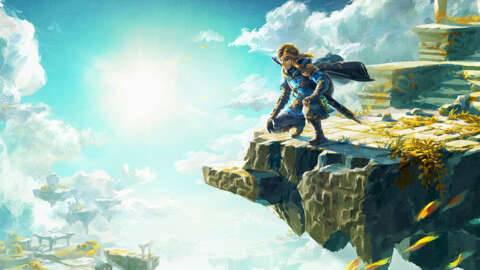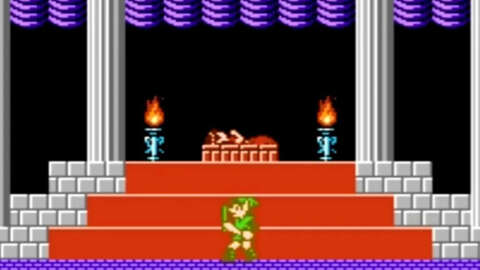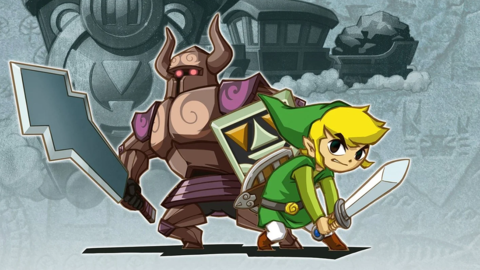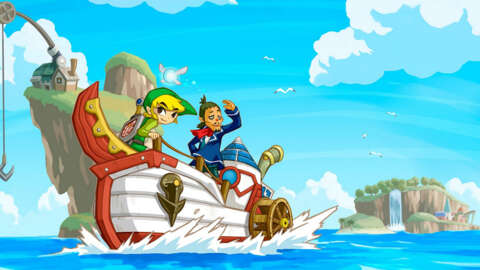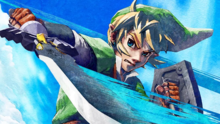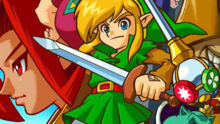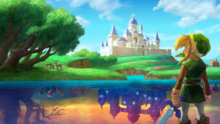The Legend of Zelda has always leaned hard on the "legend" part of its namesake. While official material like the Hyrule Historia has attempted to stitch together the various parts of the series into a cohesive whole, it's arguably best read with some flexibility as a loose assembly of similar stories with repeated themes and tropes. You'll almost always find some combination of a princess, a Master Sword, and a Triforce. And of course, there is always a hero named Link who rises to the occasion, often as the culmination of an ancient prophecy. The Legend of Zelda: Tears of the Kingdom smartly turns this most familiar of storytelling tropes on its head, and in doing so, makes Zelda the true hero of her own namesake franchise.
Spoilers for The Legend of Zelda: Tears of the Kingdom follow.
The "hero of prophecy" trope isn't unique to The Legend of Zelda, of course. It's a common trait of high fantasy, and Nintendo certainly knew it was playing in those waters when it first began utilizing it across several Zelda games. The first to do so was Zelda II: The Adventure of Link, which explained via the game manual that Link was told of an age-old prophecy about the Triforce after finding a mark on his hand as he approached his 16th birthday. (This also implies that Link was 15 or under when he first squared off against Ganon in the original Legend of Zelda, but let's just ignore that.)
The prophesied hero trope would go on to be used several times in the series history. A Link to the Past had an inscription etched into the pedestal of the Master Sword that imbued its retrieval with mystical significance.
"The Hero's triumph on Cataclysm's Eve
wins three symbols of virtue.
The Master Sword he will then retrieve,
keeping the Knight's line true."
Ocarina of Time went on to establish that Link, Zelda, and Ganondorf are part of a triumvirate of the Triforce, each representing an aspect of the goddess' power and implying that their repeated conflicts over the ages are part of a cyclical pattern of the pieces being in opposition to each other. Even Link's Awakening greeted Link with a prophecy that he might be the one foretold to "wake the dreamer" on the strange, surreal island of Koholint.
The Link we meet in Breath of the Wild, and continuing in Tears of the Kingdom, is not a fated hero. There is no stone tablet referring to his emergence. This Link is essentially a farm boy who joined the royal guard, and rose the ranks to become Zelda's personal attache. Even given all the heroics of Breath of the Wild, this Link wasn't the chosen one--he's a loyal knight who happened to be in the right place at the right time.
All of that brings us to the events of Tears of the Kingdom, where Link is still accompanying Zelda as Hyrule attempts to restore itself following the events of the Great Calamity. Those efforts have been stymied by a rising malevolent force from deep underground, and so the pair go to investigate, inadvertently freeing the imprisoned Ganondorf, who also corrupts the Master Sword. In the chaos, both Zelda and the corrupted sword go missing. This begins Link's new adventure in earnest, as he attempts to find Zelda as well as uncover the key to defeating the revived Demon King.
Through one of the major story quests, we as the audience progressively learn what actually happened to Zelda. When she fell into darkness, she blinked into the distant past during the reign of the first king of Hyrule, Rauru. The first king is one of the last of the ancient Zonai, along with his sister Mineru, and he married a Hylian named Sonia to found the kingdom by allying with the rulers of various peoples of Hyrule: Rito, Goron, Zora, and Gerudo. Each of the rulers have Secret Stones, which unlock their latent magical powers. Rauru's is a sacred power, while Sonia has time-controlling abilities. Zelda is told that as their distant heir, she has both. In fact, the four rulers, alongside Mineru and Zelda herself, are collectively identified as the Six Sages. Still, Zelda is desperate to get back to her own time, and continuously tries to hone her time powers to magic a way back to her modern kingdom.
But in this era, she also witnesses key historical events. Ganondorf, king of the Gerudo, feigns deference to King Rauru and then betrays him, killing Queen Sonia and stealing her Secret Stone. Using its power he raises an army of monsters as the Demon King and wages war against Hyrule. Rauru ultimately defeats him, but at the cost of his own consciousness. He's left frozen, holding Ganondorf in place with the sacred power of his arm--the same arm that he gives to Link thousands of years later after Ganondorf awakens in the modern era.
And this is where the story begins to turn its own legendary tropes inside-out. It's at this point, with an ailing Minaru left to care for the kingdom, that Zelda starts to put the pieces into place. As a native of the future, she already knows that Rauru's grasp won't hold forever, and Ganondorf is going to break free in her own time. At this point, her mission shifts from finding a way home to moving key pieces on a chessboard that spans thousands of years.
First, she visits Rauru's wartime allies, asking each of them to swear a pact. Someday, she tells them, a hero named Link will need to call on them for help, and when that happens they have to promise that they'll answer the call. Each of them swear an oath, binding their people to her cause. With their aid secured, she turns her attention toward restoring the Master Sword, the only weapon capable of defeating Ganondorf. Her latent sacred power is restoring it slowly--too slowly for one lifetime. The story had earlier foreshadowed that swallowing a Secret Stone transforms you into an immortal dragon, but in the process you lose your sense of self. You cease to be the person you are. So giving up her hopes of returning to her own time naturally, she makes one final, desperate act of sacrifice. She swallows her Secret Stone, transforming herself into the Light Dragon. This way she'll have thousands of years, spanning almost the entire history of the series, to keep and restore the Master Sword.
In other words: Zelda, with a level of clarity that could only come from having personally witnessed the future, meticulously puts all the pieces in place to help Link from the distant past. This iteration of Link wasn't a hero of prophecy before, but Zelda makes him one by authoring the prophecy herself.
Prophecy is a powerful idea. It's been an element of major world religions as well as classic literature for as long as either have existed. People are drawn to the idea of fate, or that there's some grand storyteller weaving our narratives. At the same time, prophecy often runs the risk of becoming dramatically inert, since it presupposes that the outcome is already determined, and once the hero emerges, they're already destined to win.
The Legend of Zelda has capitalized on prophecy as a plot device very well in the past, but Tears of the Kingdom inverts this mechanic, turns Zelda herself into the storyteller, and maintains its dramatic stakes by leaving victory far from assured. After all, Zelda is acting as a strategist here, and she hasn't seen the ultimate outcome of the battle. Instead, this is the tale of a princess who became a prophet, carefully weaving Link's story millennia in advance, and placing her trust in him to reach across the thousands of years and become the hero her kingdom needed.
